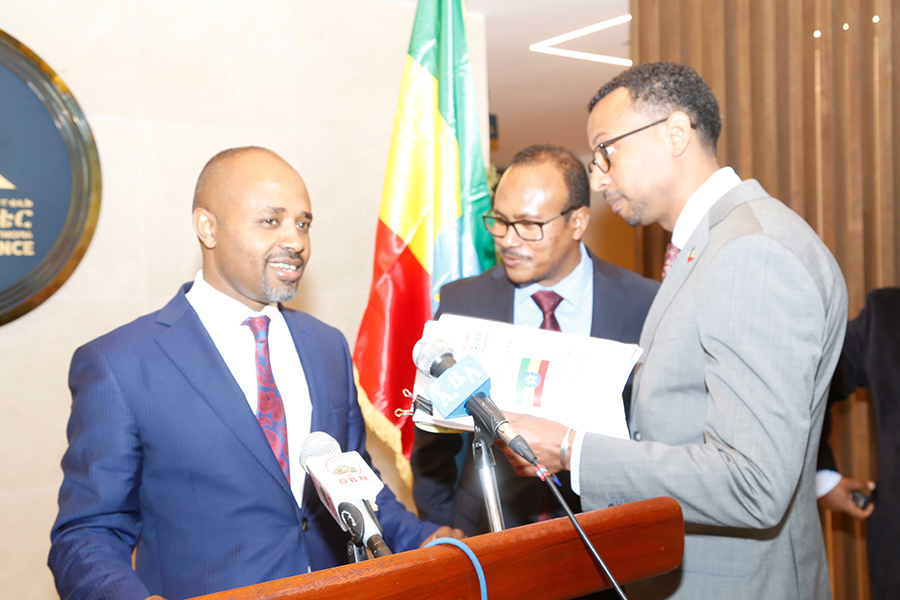
Aug 16 , 2020
By Yonas Biru (PhD)
The Nile River is an international river, and the contention is of international concern. Ethiopia is in the right, but it is not sufficient. Its strategic position must be PR smart to disarm Egypt of its instruments of last resort – misinformation and subject matter obfuscation. It must also force Sudan to take a strategic and long-term position, Yonas Biru (PhD) (biruyonas@yahoo.com), former deputy global manager of the International Comparison Programme at the World Bank and founder and chair of the Nile Club.
In substance, the difference between Ethiopia’s and Egypt’s positions on the Nile River pertains to legal rights to an equitable and reasonable share of the Blue Nile waters. Nonetheless, Egypt has succeeded in making it appear as though it is about the construction and management of the Grand Ethiopian Renaissance Dam (GERD). Ethiopia’s reluctance to engage in water sharing discussions has allowed Egypt to spin a non-issue into an existential threat to its existence and a matter of concern for global security.
Ethiopia is on equally solid grounds whether the focus of contention is on water-sharing or dam management. In deciding which option to focus on, it should concern itself with two issues: which option is more amenable to develop an effective public relations (PR) strategy and which one brings Sudan onto Ethiopia’s side. This requires understanding what gets Egypt’s pulse racing and what makes Sudan’s interest peak.
Egypt is fully aware that on balance the pros of the GERD significantly outweigh the cons. Its opposition to it is an act of coercing Ethiopia into relinquishing its water-sharing rights. Stripped of its PR manoeuvring, Egypt’s position is that Ethiopia’s share of the Blue Nile waters must be maintained at its current nil percent. This is even though Ethiopia is the source of 100pc of the Blue Nile waters, which constitute 85pc of the water to the Nile River.
In the beginning, Egypt justified its hegemonic monopoly over the Nile waters based on a 1929 colonial treaty it signed with the British government and a 1959 one it inked with Sudan.
The 1929 treaty granted Egypt 48 billion cubic metres (BCM) and Sudan 4 BCM of water allocation out of an estimated average annual yield of 84 billion cubic metres. The colonial treaty did not allocate to Ethiopia any rights to use the Nile waters, as a UN Food & Agriculture Organisation (FAO) 2016 report notes.
“Extraction of the Nile waters had to stop in Uganda, Tanzania, Kenya and even Sudan during the cotton peak demand (May-July) to secure water for this traditional Egyptian crop.”
The 1959 Egypto-Sudanese agreement took the situation from bad to worse, totally stripping Uganda, Tanzania and Kenya of the limited rights to the Nile waters granted them by the 1929 treaty. As a result, it increased Egypt’s water allocation from 48 BCM to 55.5 BCM, upped Sudan’s share from four to 18.5, and left the remaining 10 BCM for evaporation and seepage.
In recent years, Egypt has come to the realisation that neither the 1929 nor the 1959 treaty hold water in the court of public or legal opinion. Currently, it has all but walked away from the two treaties. Instead, the legal currency it is trading on is “existing use and rights” theory. Its position is that the status quo that has been established over many decades gives Egypt legal rights to its existing uses of the Nile waters.
This has brought seeds of discord between Egypt and Sudan. Sudan is currently using only 12.5 BCM. Egypt’s “existing use and rights” legal defense that is targeted at Ethiopia effectively nullifies Sudan’s 18.5 BCM allotment granted it by the 1959 treaty and binds it to the 12.5 BCM that it has been using for more than half a century.
In successfully moving the negotiation from Africa to the US, Egypt ensured international PR would be the last frontier where the battle on the Nile will be fought. To date, it has successfully framed the agenda and effectively controlled the international media from print to web and mobile. It has cleverly made the filling of the reservoir and subsequent management of the GERD as the dominating narrative of the contention.
More importantly, the focus on the filling of the GERD’s reservoir and its management has allowed Egypt to coax Sudan to dance to the tune of its PR rhythm. This is despite the fact that Sudan sees the Dam as supremely beneficial to its long-term strategic interest of increasing its water share.
Sudan’s seemingly self-defeating position is in fact a clever strategic position, as noted in a previous article for this paper penned by Yohannes Gedamu and me, headlined “Sudan’s Delicate Dance Over the Blue Nile,” published on June 13, 2020 [ VOL 21, NO 1050].
Two factors are compelling Sudan to side with Egypt in the current conflict about the filling of the Dam and its management even though both its short- and long-term interests lie squarely with Ethiopia’s position.
Primarily, Sudanese Prime Minister Abdalla Hamdok is under constant tension and elbow-throwing with powerful pro-Egypt generals presiding over Sudan's Sovereignty Council as the country's transitional head of state. He has to carefully navigate the bumpy waters of the Nile when it comes to addressing its contentions with Egypt.
By siding with Egypt in the current contention, he can appease the high brass generals without losing much. Sudan understands the GERD’s completion is a forgone conclusion. Siding with Egypt is a necessary short-term sacrifice for a more significant long-term agenda.
The bigger picture is that by siding with Egypt, Sudan is forcing Ethiopia to hold the proverbial bull by the horns to bring the water-sharing issue front and centre. Prime Minister Abdalla Hamdok would conceivably want to see an end to Egypt’s near-hegemonic control over the Nile waters. He sees a real potential to get more water than the 18.5 BCM that is stipulated in the 1959 treaty with Egypt. His strategy is to use Ethiopia as leverage without appearing to side with the East African country.
In short, rather cleverly, Sudan wants Ethiopia to raise the mantle and challenge Egypt's hegemonic claim over the Nile. In the process, Sudan gets more water and sees the GERD fully operational without facing off with his pro-Egypt bosses.
Understanding Egypt’s and Sudan’s gambits in their simplicities and complexities allow Ethiopia to understand why it has lost the international PR tussle and why it must change course.
Egypt has put Ethiopia in a bind using a campaign of misinformation and artful subject matter obfuscations. In the current negotiation, one of the sticking points has been whether to call the agreement on the filling and management of the Dam as “Guidelines and Rules” or christen it as a “binding agreement” that would elevate it to the status of treaty.
Egypt’s intention is to use a technical and managerial issue of the GERD into a cast iron water-sharing commitment etched in stone. This is a strawman tactic to use the proverbial tail (GERD) to wag the dog (the Nile). Ethiopia's government rightly refuses to do anything that will put the country at a disadvantage when the time comes to negotiate the terms and conditions of the water-sharing treaty with Sudan and Egypt.
Reading international commentaries makes one believe that the primary sticking points that has created a deadlock between Ethiopia, Egypt and Sudan is the former's refusal to agree on establishing a binding agreement governing the filling and usage of the GERD.
At face value, to the uninitiated and uninformed international observers, Ethiopia’s position appears unholy. This has given Egypt a field day in making its campaign of misinformation a staple for the international mainstream media.
If one looks at some of the recent newspaper narratives - including the Washington Post, Bloomberg, US News & World Report, andQuartz Africa- Ethiopia's refusal to agree on a binding settlement is presented as a sticking point, if not a stumbling block. In July alone, there were over two dozen articles (mostly from Egypt) raising this issue as an obstacle.
Here is how the Washington Posthas put it: "Hisham Kahin, a member of Sudan’s legal committee in the Dam negotiations, said 70pc-80pc of negotiations turned on the thorny question of whether an agreement would be legally binding. Ethiopia, he said, fears a binding agreement will hinder its future development projects. Sudan and Egypt consider it critical."
The US NEWSheadline reads: "Ethiopia Dam Reservoir Filling as Talks with Egypt, Sudan Stall" and attributed the problem to failure to reach a binding agreement.
The current mediation strategy has allowed Egypt to take the PR upper hand while hiding its true intentions of denying Ethiopia and Sudan their fair shares of the Nile waters.
The Nile River is an international river, and the contention is of international concern. Ethiopia is in the right but it is not sufficient. Its strategic position must be PR smart to disarm Egypt of its instruments of last resort – misinformation and subject matter obfuscation. It must also force Sudan to take a strategic and long-term position.
Prime Minister Abiy needs to grab the bull by the horns and bring the water-sharing issue front and centre. He should publicly ask President el-Sisi a simple question:
“Mr. President, what in your opinion should be the equitable and reasonable share of the Blue Nile waters for Ethiopia and Sudan?”
Checkmate!
PUBLISHED ON
Aug 16,2020 [ VOL
21 , NO
1059]


Radar | Oct 16,2021

Radar | Mar 20,2021

Viewpoints | Nov 02,2019

Radar | Feb 06,2021

Radar | Nov 09,2024

Viewpoints | Sep 14,2019

Fortune News | Nov 29,2020

Viewpoints | Apr 28,2024

Fortune News | May 16,2020

Fortune News | Mar 19,2020

Photo Gallery | 176633 Views | May 06,2019

Photo Gallery | 166844 Views | Apr 26,2019

Photo Gallery | 157386 Views | Oct 06,2021

My Opinion | 136927 Views | Aug 14,2021

Dec 22 , 2024 . By TIZITA SHEWAFERAW
Charged with transforming colossal state-owned enterprises into modern and competitiv...

Aug 18 , 2024 . By AKSAH ITALO
Although predictable Yonas Zerihun's job in the ride-hailing service is not immune to...

Jul 28 , 2024 . By TIZITA SHEWAFERAW
Unhabitual, perhaps too many, Samuel Gebreyohannes, 38, used to occasionally enjoy a couple of beers at breakfast. However, he recently swit...

Jul 13 , 2024 . By AKSAH ITALO
Investors who rely on tractors, trucks, and field vehicles for commuting, transporting commodities, and f...

Oct 18 , 2025
The political establishment, notably the ruling party and its top brass, has become p...

Oct 11 , 2025
Ladislas Farago, a roving Associated Press (AP) correspondent, arrived in Ethiopia in...

Oct 4 , 2025
Eyob Tekalegn (PhD) had been in the Governor's chair for only weeks when, on Septembe...

Sep 27 , 2025
Four years into an experiment with “shock therapy” in education, the national moo...

Oct 18 , 2025 . By NAHOM AYELE
In a sweeping reform that upends nearly a decade of uniform health insurance contribu...

A bill that could transform the nutritional state sits in a limbo, even as the countr...

Oct 18 , 2025 . By SURAFEL MULUGETA
A long-planned directive to curb carbon emissions from fossil-fuel-powered vehicles h...

Oct 18 , 2025 . By BEZAWIT HULUAGER
Transaction advisors working with companies that hold over a quarter of a billion Bir...